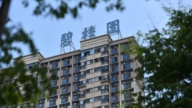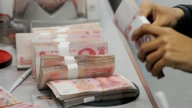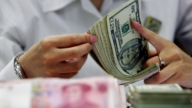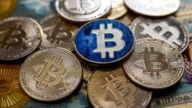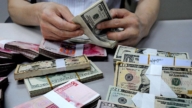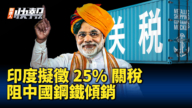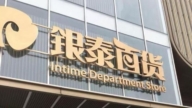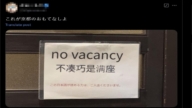【新唐人2013年07月18日讯】在很多经济学家大谈中国经济硬着陆,经济危机已经悄然来临的同时,中共统计局宣布,中国上半年GDP同比增长7.6%。不过这个数字,令外界跌破眼镜,认为无法与中国社会出现的钱荒、通货膨胀、失业和外资的撤逃,以及股市、房市等经济下滑的现况相匹配,也背离了“李克强经济学”所谓回归市场的规律。
7月15号,统计局公布上半年经济数据,上半年国内生产总值(GDP)248,009亿元,同比增长7.6%,二季度GDP同比增长7.5%。
美国南卡罗莱纳大学艾肯商学院教授谢田:“中共的统计数字是完全不可信的,它造假显现出来的虚假的繁荣与它的钱荒,通货膨胀和其他令民众不满的失业和外资的撤逃,和股市、房市都是不相匹配,在GDP上造假,其他方面很难圆融。”
北京“天则经济研究所”副所长冯兴元,日前向《新唐人》表示,经济危机在中国已经局部爆发。英国《金融时报》财经版块主编徐瑾则撰文说,中国经济增速将下台阶,已逐渐成为业界共识,但北京所能容忍的经济增长“下限”仍讳莫如深。中共总理李克强的忧虑,恐怕难以随着李克强经济学的走红而消解。
“李克强经济学”是以限缩政府行政职能、利率市场化、淘汰落后产能等,挤掉GDP“水分”,以短痛换得健康的经济成长。
台湾中华经济研究院研究员吴惠林: “李克强经济学,其中有一个东西是不要去刺激经济,让经济增长。那当然掉的就会更快,跟过去完全相反,一涨一缩,掉的就非常大,可是现在所公布的降的不是那么大,这个就非常让人怀疑。”
7月9号,统计局公布生产者物价指数(PPI)数据显示,PPI同比下降2.7%,已经连续16个月下降,而消费者物价指数(CPI)则在上涨,两者呈燕尾式背离状态,不符合价格传导规律。
7月1号,中共当局发布制造业采购经理指数(PMI)降到50.1%,创4个月以来新低。同一天,汇丰控股发布的PMI终值为48.2,更是跌破代表制造业扩张与收缩的荣枯线50%,创9个月以来新低。
7月10号,中共海关总署公布的外贸数据显示,6月份进出口贸易数字双降,出口同比下降了3.1%,进口同比下降了0.7%。
各路经济学家早已指出,中国固定资产投资严重失衡,地方债务高筑,面临大量违约风险,拉动中国经济的三驾马车——投资、消费、出口全部趴下,而国内消费早就一年不如一年。
谢田:“它(中共当局)在系统性的给它提高了一个数字,或者变换数字,实际上从它造假的数字当中,我还是可以分析出来它的一些趋势,从最新的趋势看来,它也不得不承认,中国的经济危机已经在发生之中,这实际上我们大概在两个月之前就提出来过了。”
国务院参事夏斌撰文指出,中国已存在事实上的经济危机,之所以危机还没有引爆,坏账没有暴露,是靠多发货币掩盖。夏斌还指出,当前的中国经济,不整顿,早晚要出事,但是整狠了,马上就出事。
7月11号,中共财政部长楼继伟在华盛顿接受记者采访时说,中共当局今年的目标,未来也许可以容忍低到6.5%的水平。楼继伟还说,今年的增长目标是7%。
谢田:“有一个可能,现任经济决策层不愿意背前任的黑锅,在外界的压力之下,慢慢的把中国的经济暴露出来,这样的话,他们可以撇清他们和前任的关系。”
不过,7月13号,中共喉舌《新华社》一篇英文稿,将此前引用楼继伟说的GDP增长为7%的报导,修改到7.5%,以符合官方宣布的目标。
谢田:“它如果把中国的造假一下就全部公开,让人们大吃一惊,极为震惊的话,可能会危及的政权的稳定,我想它就是用温水煮青蛙的方式,慢慢的降低。”
台湾中华经济研究院研究员吴惠林教授指出,中国经济面临崩溃已经是经济学家的共识,只不过,是以硬着陆或是软着陆的方式崩溃,专家们还存在一些分歧。
采访编辑/刘惠 后制/钟元
China’s GDP – Going Against Premier Li Keqiang’s Plan?
Many economists are talking about China’s economic
hard landing, and ongoing economic crisis.
China’s Statistic Bureau said that in the first half of
the year GDP grew 7.6%. However, this data is questioned by economists.
They say, it does not explain the recent problems of cash
shortage, inflation, the unemployment rate and cash outflow.
In addition, it doesn’t comply with stock market and
house price’s decline.
It also flies in the face of Premier Li Keqiang’s Economic plan.
On July15, China’s Statistics Bureau data shows that
in the first half of the year GDP’s absolute value reading
of 24.8 trillion yuan (US$4 trillion), increased 7.6%.
The 2nd quarter GDP growth slowed to 7.5%.
Xie Tian, professor at Aiken Business School of
the University of South Carolina:"The data isn’t reliable.
The CCP’s created surplus flourish doesn’t tally with
recent cash shortage, inflation, unemployment,
cash outflow, stock market and housing market problems.
The CCP made up a false GDP, other factors and indicators
do not match with it."
Feng Xingyuan, deputy director of Beijing Unirule Institute
of Economics told NTD that
a financial crisis has already started in some areas of China.
Financial Times editor Xu Jin published an article stating that
China’s falling economic growth is common knowledge.
How much of this can Beijing take? it’s unclear.
Li Keqiang’s worries are unlikely to clear up just by
increasing the popular of his economic plan.
Li Keqiang pledged to shrink the governmental administrative
overload, allowing the market to play a full role,
discarding outdated production methods, and verify the
correct GDP, in order to produce a healthy economic growth.
Wu Yuyin, research fellow of Chung-Hua Institution for
Economic Researcher: “One major drawback in Li Keqiang’s
economic plan is that there is no economic stimulus. Just let
it grow.
Growth will decrease faster, the very opposite of past patterns,
one rising, one shrinking. It will slowdown greatly.
According to the latest data, this didn’t decline too much,
That’s why we doubt it."
On July 9, the data for the Producer Price Index shows (PPI),
PPI dropped 2.7%, declining for 16 consecutive months;
while the Consumer Price Index (CPI) is rising .
These trends do not meet the price transmission rules.
On July 1, the latest data shows Manufacturing Purchasing
Managers Index (PMI) dropped to 50.1, the lowest level in the last 4 months.
On the same day, HSBC’s PMI dropped to 48.2.
That is below the cut-off level of 50 that divides expansion
from contraction, the lowest in the last 9 months.
On July 10, China’s trading data shows exports and imports
both dropped in June. Exports fell 3.1% and imports fell 0.7%.
Earlier economists have pointed out that China’s
fixed assets investment is seriously imbalanced.
Local debt has greatly accumulated,
facing substantial risk of breaching the contract.
It has dragged down investment, consumption and exports.
Yet domestic consumption is increasingly
worsening each year.
Xie Tian:"The CCP systematically increases statistical
numbers, or doctor the figures.
From the false data I can analyze some of the trends.
We can tell from the latest trends,
the CCP has had to admit that
China’s financial crisis is already happening,
we actually talked about it two months ago."
Xia Bin, Counselor of China’s State Council said that
actually China’s economic crisis already exists.
What’s the reason it hasn’t detonated yet?
Because the bad debt is not exposed,
it is covered up by producing more currency.
Xia Bin said that if China’s economy is not dealt with now,
sooner or later something severe will happen.
But, if interfered with too drastically
the bad thing will happen immediately.
On July 11, Lou Jiwei, Minister of Finance said
in an interview in Washington that the authorities this year can accept GDP slowed 6.5%.
Lou added that, they expected GDP’s growth will drop to 7%.
Xie Tian: “One possibility is that the current decision-makers
do not want to take the blame for the former leaders.
Under pressure from the outside world,
China’s true economy is gradually being exposed,
so that they can distance themselves
from the former leaders."
On July 13, the CCP mouthpiece Xinhua News Agency
published an English article;
Lou’s saying that the GDP growth of 7%, was modified
to 7.5%, so as to match the figure that was officially released.
Xie Tian:"If the CCP completely exposed its true economy,
people will be surprised and shocked.
It may trigger a political crisis and instability.
I think they want to take some time to slowdown
the figure gradually."
Wu Huilin said that China’s economy is facing collapse.
It has become the common knowledge of economists.
However, by which way it will collapse;
a hard landing or soft landing? Experts are still in debate.



